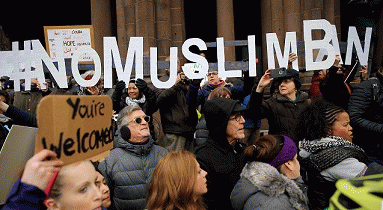From WSWS
A three-judge panel of the Ninth Circuit Court of Appeals, based in San Francisco, will hear oral arguments Tuesday on the travel ban on visitors from seven Muslim-majority countries imposed by the Trump administration January 27 by executive order.
The hearing was announced Monday evening, shortly after the administration filed legal briefs with the appeals court seeking to overturn the decision by Judge James Robart, a federal district judge in Seattle, who issued a temporary restraining order blocking enforcement of the Muslim ban.
The three judges include William Canby Jr., appointed by Jimmy Carter; Richard Clifton, appointed by George W. Bush; and Michelle T. Friedland, appointed by Barack Obama.
The hour-long hearing, with 30 minutes for each side, will take place at 6 pm Tuesday, Eastern Time, or 3 pm Pacific Time, with a recording of the hearing released to the public after the conclusion of the arguments.
The states of Washington and Minnesota brought the suit charging that the executive order issued by Trump is unconstitutional because of its brazenly religious character. They also argued that it damages the interests of citizens of those states as well as institutions such as universities and corporations whose students and employees are affected by the ban.
Fifteen more states, with a combined population of more than 100 million people, filed an amicus brief Monday supporting the position of Washington and Minnesota. The brief was drafted by attorneys for California, New York, Pennsylvania and Massachusetts.
Connecticut, Delaware, Illinois, Iowa, Maine, Maryland, New Mexico, Oregon, Rhode Island, Vermont, Virginia and the District of Columbia joined in supporting the brief. The state of Hawaii filed a separate motion in support of Washington and Minnesota. Nearly all these states are governed by Democrats.
The 15-state brief detailed the impact of the ban on the educational and health care systems in many of the states. California Attorney General Xavier Becerra said that medical school programs would "risk being without a sufficient number of medical residents to meet staffing needs," and that more than 2,000 students set to enroll in the state's college and university system would be affected.
The main argument presented by the Trump administration was the claim that the states have no legal standing to challenge the executive order, and that the president's power to control immigration is conferred both by the Constitution and federal law and is absolute and unreviewable by any court.
"Judicial second-guessing of the president's national security determination in itself imposes substantial harm on the federal government and the nation at large," Justice Department lawyers wrote in legal papers defending the executive order.
At the court hearing last Friday, Washington state Solicitor-General Noah Purcell responded by saying, "They're basically saying that you can't review anything about what the president does or says, as long as he says it's for national security reasons. And that just can't be the law.''
Aside from the obviously authoritarian character of the administration's claim, this is the diametric opposite of the position taken by Republican state attorneys general in 2015 when they argued -- successfully -- before the Fifth Circuit Court (based in New Orleans) that they had standing to challenge President Obama's executive order exempting several million long-settled undocumented immigrants from deportation.
The Trump brief also urged the Ninth Circuit to reject out of hand any arguments based on religious discrimination, since the text of the executive order does not explicitly call for a ban on Muslims. Trump's numerous statements declaring that he wished to impose a Muslim ban, and his seeking advice on how to word such a ban so that it would pass legal muster, could not be considered by the court, the brief argued, because this would involve investigating the motives of the executive branch, and would thus breach the separation of powers. The contrast between this argument and Trump's own conduct, tweeting imprecations against Judge James Robart and all but branding him a terrorist sympathizer, is stark.
The brief filed by Washington and Minnesota replied that "courts have both the right and the duty to examine defendants' true motives," and cited precedents linked to previous Supreme Court decisions in relation to discrimination against gays and other disfavored minorities.
(Note: You can view every article as one long page if you sign up as an Advocate Member, or higher).





